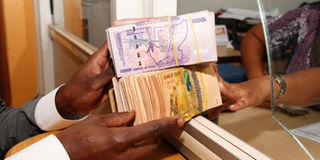Be mindful while depositing rent money

It is difficult to come to terms after you discover that you have been defrauded of your rent money. PHOTO/FILE.
What you need to know:
- Data from Uganda Bureau of Statistics indicate that the country’s urbanisation rate is estimated at 5 per cent per annum, with Kampala alone projected to host 10 million people by 2050.
How do you resurrect from the shock of being defrauded on the excuse that you have to deposit on rent? Rachel Nabisubi writes.
The hassle of searching for a place to live is not only a debt in itself but a burden that comes with a lot of challenges.
When Evelyn Nanyonjo was searching for a house, she was lucky to find one. She was relieved and eagerly waited when she could move in, in her new house.
But trouble started early. Her supposed ‘landlord’ had requested that she deposits part of the rent as a show of commitment.
“I deposited some money with the thought that the search for a house had ended,” Nanyonjo recalls.
However, to her shock, when it was time to move in, the ‘landlord’ had vanished and was nowhere to be seen.
“I had deposited Shs1.5m as rent but later realised that the house had already been sold to someone else. He had sold it to another person and vanished,” she adds.
Nanyonjo is not alone. A number of tenants have been defrauded in the name of depositing money as a show of commitment.
Shirley Kongai, the Association of Real Estate Agents in Uganda president, wonders why the requirement to deposit money on rent as a show of commitment has been normalised.
Such challenges and more, she says, are becoming problematic and must be addressed by all means.
“These are some of the things that would be sorted when the Real Estate Law is passed. Because the law guarantees that tenants will be dealing with registered agents that have physical addresses,” Kongai says, noting it is not written anywhere that you must commit on a rental by depositing part of the rent value.
In this way, she says, chances that tenants are defrauded will be limited because the law carries repercussions under which a fraudulent agent would be dealt with.
It is important to note that Parliament is working on a new Bill that seeks to regulate land and property dealers.
The Bill, currently before Parliament, will stipulate clear terms of engagement in real estate transactions, eliminate unscrupulous agents and eliminate speculation, which has been a major challenge of the real estate market sector.
It should also be noted that over the years, fraud and other illicit transactions, have been normalised, prompting the Financial Intelligence Authority to put the industry under watch.
The Bill, which will soon be tabled for first reading in Parliament, seeks to protect the interest of consumers in light of increasing fraud that relates to real estate.
It also seeks to promote public confidence in the performance of real estate business.
However in the meantime, Kongia says, what is important, as we wait for the law, is for tenants to exercise due diligence before depositing any money.
“Tenancy agreements are not a luxury but a must. Witnessed by lawyers or at worst local council officials to mitigate fraud,” she adds.
Tenants can also verify agents by checking membership associations some of whom belong to .
“Truth is, no one is ‘watching’ what is happening in the sector. All has been left ‘to whom it may concern’. We don’t even have data of what is going on. I think the real estate sector has been let down,” Kongia says.
Therefore, it her wish that Ugandans learn to be professional in business dealings, key among them in the real estate sector.
The Real Estate Agency Bill 2020, according to Andrew Mukiibi, who is the former president of the Association of Real Estate Agents in Uganda, will mandate registration of all licensed agents and provide acceptable commission rates and property values.
This, he said during a consultative stakeholders meeting, will enhance transparency in real estate dealings.
In addition to this, Mukiibi says, the Bill seeks to promote professional conduct of agents, restore sanity in the sector by eliminating quack agents and unprofessional players through a properly defined licensing regime.
Growth
The real estate and construction sector in Uganda is believed to be among the top contributors to gross domestic product, estimated at 10 per cent.
This puts the housing deficit at 2.5 million units, with most of the deficit registered in Kampala alone.
Data from Uganda Bureau of Statistics indicate that the country’s urbanisation rate is estimated at 5 per cent per annum, with Kampala alone projected to host 10 million people by 2050.
[email protected]




